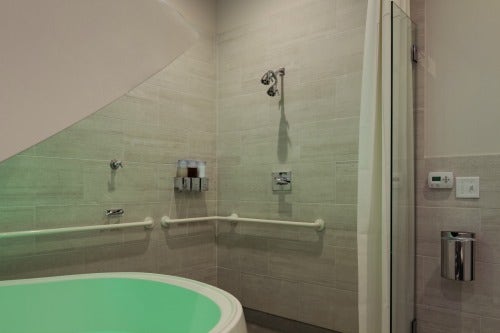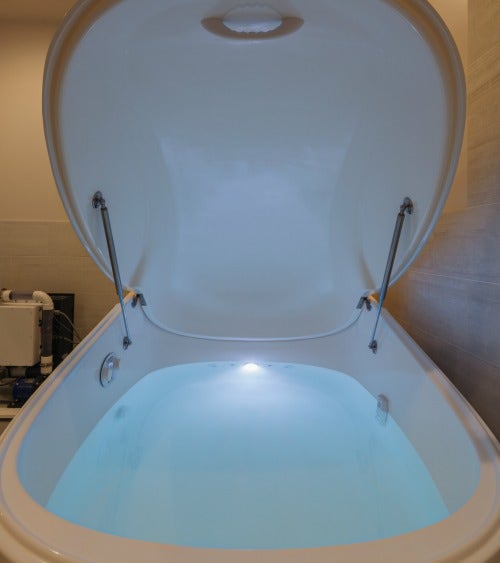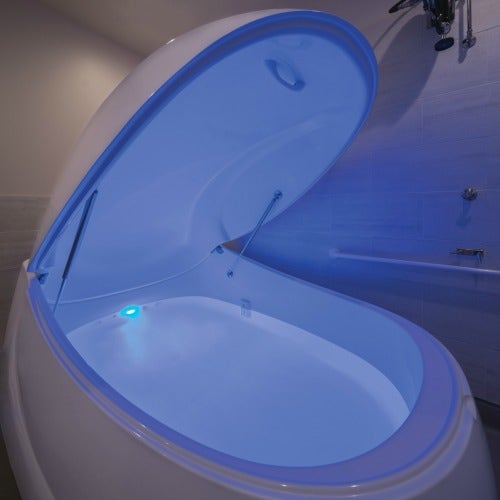
I was existing both inside and outside of my body at the same time.
By Jennifer Billock
Last updated on Apr 13, 2024
Photo: hedgehog94 | Shutterstock

My heartbeat is thunderous, pounding in my ears like an entire line of bass drums surrounding me in the water. It's too dark to see, but that doesn't stop me from lifting my arms and trying to conduct the drummers into a more rhythmic beat. After what seems like a couple of minutes — but could be thirty, who knows — I'm able to calm the cadence. My mind wanders. I push a button off to my side and soft music floats through the air around me as I drift off into nothingness. I don't know what time it is. I don't know where I am. All I know is that I'm somewhere, a middle world out in space or tucked into a quiet, safe place on the edge of this dimension.
In reality, I was in downtown Milwaukee lying in a float pod, trying a sensory deprivation tank for the first time. I wasn't entirely sure what to expect when my colleague and I stepped into Float Milwaukee. Not knowing anything about sensory deprivation tanks aside from the few times I walked past a scummy-looking place in Chicago, I pictured rows of tanks lined up in a big room with a person in each, like some weird cryogenics facility. Thankfully, Float was more than professional, set up like a day spa, and full of energetic, enthusiastic staff who don't plan to stick you into an icy tomb for all eternity.
RELATED: How 45 Minutes In A Salt Cave Transformed My Body
The concept is simple: You go into a private room, undress and shower, then climb into a large pod full of highly-salinated water. You close the lid (don't worry claustrophobes, it doesn't lock), push a button for music and another for a light if you want them, lay back, and float away in the darkness.

The water matches the temperature inside the pod exactly, so it becomes increasingly hard to determine where liquid ends and air begins throughout the float. Another reassuring reason, aside from privacy, is that each pod is in its room: no one can hear you laughing like a psychopath when you feel like an inanimate object. Andy Larson, Float's owner, tells me floating helps with relaxation, meditation, injury recovery, pain relief, and PTSD, and can enhance creativity and focus. Some people swear by the tanks — and now, I do too.
RELATED: 10 Easy Ways To Completely Chill Out (When You Feel Overextended)
As I drifted off in my cocoon of safety and warmth on the edge of consciousness, my creative energies took hold. I discovered that if I kicked my hips out to the side just a little, I crumpled like a marionette. So I became a one-woman puppet show, crunching side to side, pretending some unseen force in the pitch-blackness was pulling my strings. When I stopped moving, the music carried me away, far into the corners of my imagination. A few writing ideas came and went, and before long I was just gone. I had reached my Zen state, the height of meditation.

I didn't feel anything around me. I didn't recognize that I was in a pod in a spa with people in other rooms. I didn't see anything. I communed with my subconscious. I wasn't asleep, but I wasn't completely awake. I simply was. I don't know how long I remained in that state; time is fluid inside the float tanks. A tap on my foot from the side of the pod finally pulled me out of my reverie; apparently, I had drifted a little to the side. I noticed my shoulders weren't hurting anymore as they had been all day. The slight depression I'd carried with me for a week or so was gone. I felt confident. I felt strong. It was amazing. When the light in the pod kicked on (it's on a timer so you know when your session is up), I wanted to shut it off and stay in there forever.
RELATED: What Happened When I Tried Guided Meditation For Anxiety In A Room Full Of Strangers

All photos: Float Milwaukee
Related Stories From YourTango:
Everyone's float is different and everyone comes out feeling a different way. I was relaxed and wanted to nap. My colleague was energized and ready to take on the world. Andy, who saw billions of stars floating around him in his last float, came out physically and mentally recharged. When you're in the pod, you're comfortable alone in the universe, exploring the depths of your mind. The effect of that follows you back out into the world — but in what way, only you can know.
RELATED: I Tried Flotation Therapy — Here's What Happened
More for You:
Jennifer Billock is an award-winning writer and best-selling author. She's been published in The New York Times, Smithsonian, Wired, and National Geographic Traveler.
